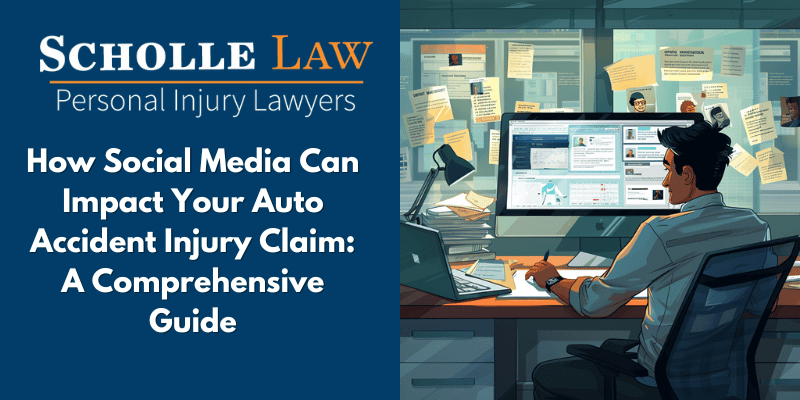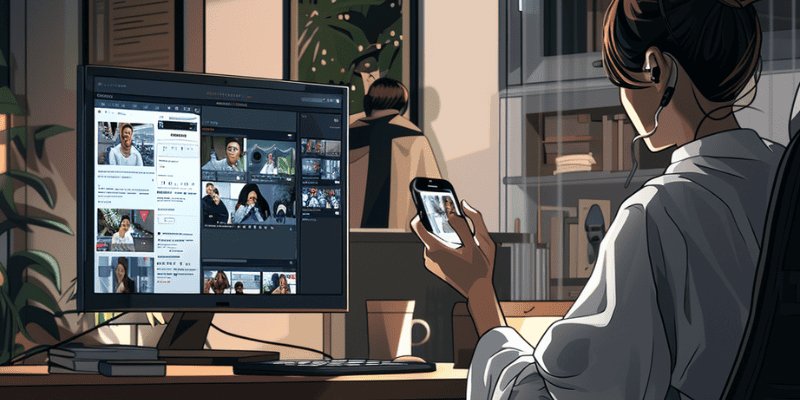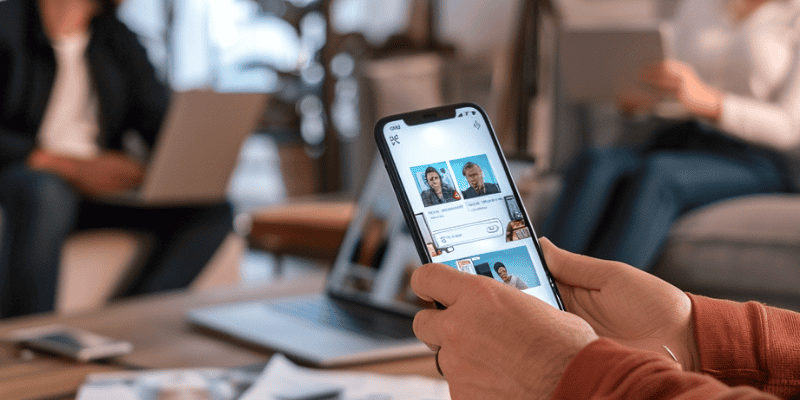4.9 Rating
Google REVIEWS
Leaders in Georgia Personal Injury Law Since 1995
How Social Media Can Impact Your Auto Accident Injury Claim: A Comprehensive Guide
Social media is omnipresent in our lives, but when it comes to auto accidents, your online behavior matters more than you might think. This article discusses how social media can impact your auto accident injury claim, offering insight into the subtle ways your public expressions could influence the settlement. Prepare to understand the crucial dos and don’ts of your digital life in the context of legal scrutiny, without spoiling the strategic advice contained in the following sections.

Key Takeaways
- Social media can significantly impact an auto accident injury claim, as insurance adjusters and defense attorneys might use posts, photos, or comments to challenge the claimant’s credibility and the severity of their injuries.
- Maintaining strict privacy settings, being cautious about friend requests post-accident, and refraining from social media discussions about your health or the legal process are recommended to protect your personal injury claim.
- Consulting with personal injury lawyers is crucial as they can provide guidance on social media use and help prevent posts from harming your case in court, including advising on the production of social media records during litigation.

The Influence of Social Media on Your Car Accident Claim
In the world of personal injury claims, social media can be both a friend and a foe. On one hand, it serves as a social media platform to express solidarity and share experiences. On the other hand, it can provide evidence that could potentially undercut your claim. Insurance adjusters and defense attorneys can use your social media posts, photos, and comments to challenge the validity of your car accident claim.
Sharing too many personal details or disclosing detailed medical information after an accident on social media can lead to direct challenges against the severity of your reported injuries. In essence, your social media activity can provide an opposing party with ammunition to undermine the credibility of your claim. Therefore, maintaining self-awareness and discretion about your online presence is essential.
The Perils of Posting After an Accident
We live in a world where sharing is the norm. But after an accident, oversharing on social media can be more harmful than you might think. Sharing details about your physical condition post-accident can reveal inconsistencies with the injuries claimed, potentially damaging your compensation claim.
Activities or photos shared on social media that suggest a level of physical ability inconsistent with claimed injuries can be damning in court. Hence, it’s advisable not to post about the accident, personal injury claims, or your health condition after the incident. It is always wiser to prioritize caution rather than risking regret later. Safety should be the foremost consideration in any decision-making process.
The Trap of Check-Ins and Location Updates
Your check-ins and location updates might seem harmless, but in the context of an auto accident injury claim, they could potentially harm your case. Check-ins at locations or events could cast doubt on the extent of your injuries and potentially harm your compensation claim.
Sharing check-ins on social media can provide the opposing side with evidence of your activities and whereabouts. After a car accident, caution needs to be exercised to avoid suggesting the ability to engage in activities conflicting with claimed injuries.
Understanding Privacy Settings and Friend Requests
Given the potential risks that social media can pose to your injury claim, understanding and managing your privacy settings is of prime importance. After an accident, tweaking your social media privacy settings can shield you from unwanted scrutiny during a personal injury claim.
Be selective about accepting friend requests, especially from unknown individuals, as they may be insurance adjusters or defense lawyers seeking to access private social media content. Remember, even with stringent privacy settings, insurance companies can still legally view public posts, and courts may order the production of social media content.
Navigating Social Media During Your Injury Case
Navigating social media during your injury case demands considerable diplomacy and caution. Legal guidance from personal injury lawyers is invaluable as they comprehend the legal implications of social media posts and understand how to navigate these platforms without jeopardizing a claim.
During a personal injury claim, it’s prudent to:
- Avoid accepting friend requests from strangers
- Avoid updating statuses after court hearings
- Not discuss the injury claim, interactions with legal counsel, or personal feelings about the legal process on social media
This is to avoid undermining one’s legal position.

To Share or Not to Share: Social Media Dos and Don’ts
Deciding what to share and what to withhold on social media during a personal injury claim is a critical consideration. A general rule of thumb is to refrain from posting new content on social media during a lawsuit to avoid potential misuse of the information by the opposing party.
It’s equally important to advise friends and family not to post about you or your accident, as these posts could inadvertently damage the legal case. Comprehending and enacting cautious social media practices is vital to support and strengthen a personal injury case.
The Implications of Online Interactions
Online interactions can have far-reaching implications on your personal injury claim. Interacting with an insurance company or their representatives on social media can negatively affect your compensation. To avoid these issues, consider filing your personal injury claim online.
Furthermore, engaging in activities that contradict testimony in a personal injury case can be discovered through social media and used to reduce or deny compensation. Therefore, it is advisable to avoid commenting on any social media posts to prevent giving opposing lawyers ammunition that could be used against you in your personal injury case.

Legal Insights: Seeking Advice from Personal Injury Lawyers
When dealing with personal injury claims and social media, consulting a personal injury lawyer from Scholle Law for legal advice is essential. They understand the impact of social media on personal injury claims and can guide clients in preventing social media posts from potentially harming their personal injury claim in court.
The advice of a seasoned personal injury attorney is key to securing a successful outcome in a personal injury claim. We can help you navigate the complexities of how online activities may be perceived legally, providing you with the necessary insight to handle social media professionally when seeking legal advice.
How Legal Counsel Can Protect Your Online Profile
Legal counsel from Scholle Law can play a decisive role in protecting your online profile during a personal injury claim. They can:
- Guide you in setting social media profiles to private
- Caution against accepting new friend requests
- Advise on general social media use to safeguard your online profile.
Keep in mind that even private messages related to the case are not entirely secure and could be disclosed through court orders. So, it’s always best to discuss anything accident-related with your legal counsel before posting it online.
The Role of Attorneys in Monitoring Social Media Activity
Attorneys at Scholle Law can play a significant role in monitoring your social media activity to make sure it’s consistent with your case. We can provide guidance on responding to discovery requests where social media records need to be produced during litigation.
Sometimes, our attorneys might advise a total cessation of social media use to prevent any risk of posting content that could compromise the chance of a successful injury claim outcome. This is one of the many ways attorneys can help safeguard against self-incriminating social media posts.
The Consequences of Missteps in Social Media Use
Missteps in social media use can have severe consequences on your personal injury claim. Deleting posts or messages during a personal injury claim can be perceived as an attempt to conceal evidence, which might lead to suspicions of spoliation or foul play by courts and insurance companies.
Investigators and attorneys extensively scrutinize social media accounts to find social media evidence of inconsistencies or contradictions in the claimant’s account of their injury and recovery process. This underscores the need to be mindful of your social media posts and shares.

Stories of Social Media Mishaps
Social media mishaps can lead to a weakening of claims and reduction in settlement offers. For instance, posting about attending a party while claiming severe injuries can lead to a reduction in settlement offers and possibly lost wages, as it weakens the injured party’s position.
Similarly, social media posts expressing gratitude for being unharmed after an accident can be used as evidence to suggest the accident did not cause significant harm, challenging the injured party’s claims of severe consequences. These stories act as warnings, emphasizing the need for judicious social media use during a personal injury claim.
Lessons Learned: Avoiding Common Pitfalls
Learning from these stories, there are some common pitfalls that you can avoid. Deleting or altering social media posts after an accident can be considered spoilation, which is potentially a criminal act as it pertains to destroying or modifying evidence relevant to a legal case.
Therefore, avoiding common mistakes during the legal process of an ongoing personal injury case is vital to prevent self-incrimination and weakening of your personal injury claim. These lessons could prove invaluable in safeguarding your legal rights and securing fair compensation for your injuries in personal injury cases.
When to Disconnect: Deactivating Accounts During a Claim
In some cases, the best course of action might be to disconnect from social media entirely. Deactivating social media accounts is often recommended by legal professionals until a personal injury case is resolved to avoid providing evidence that could weaken the case.
Taking a complete break from social media while your claim is pending is one way to eliminate the risk of misinterpretation.
Expert Guidance for Your Online Activities Post-Accident
While coping with the aftermath of an accident, considering expert advice for your online activities is essential. Regularly purging old content, using a VPN without logs, and documenting the accident privately on your device are some of the measures recommended by experts to protect your legal standing.
Summary
In conclusion, understanding the relationship between social media and personal injury claims is paramount in today’s digital age. The influence of social media on your car accident claim, the perils of posting after an accident, the implications of online interactions, and the role of legal counsel from Scholle Law in navigating all these complexities are crucial aspects to consider. Remember, it’s always better to stay safe than sorry, especially when it comes to the realm of social media during a personal injury claim.
Frequently Asked Questions
Can social media posts be used as evidence in court?
Yes, social media posts can be used as evidence in court to challenge the validity of a car accident claim.
What are some common social media mistakes to avoid during a personal injury claim?
During a personal injury claim, it’s crucial to avoid sharing accident details or physical condition on social media, altering posts, and interacting with insurance companies. Be mindful of what you share online to protect your claim.
How can legal counsel help protect my online profile during a personal injury claim?
Legal counsel can provide guidance on setting social media profiles to private, caution against accepting new friend requests, and advise on general social media use to safeguard your profile during a personal injury claim. This can help protect your online presence and prevent any potential harm to your case.
Is it recommended to deactivate social media accounts during a personal injury claim?
Deactivating your social media accounts is often the best course of action during a personal injury claim to prevent the risk of weakening your case with unintentional evidence.
What is expert guidance for online activities post-accident?
After an accident, it’s recommended to regularly delete old content, utilize a VPN with no logs, and privately document the accident on your device for online activities.
